Leon’s Diary – February 1944 to September 1944
Italian Campaign – Monte Cassino
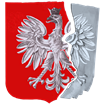
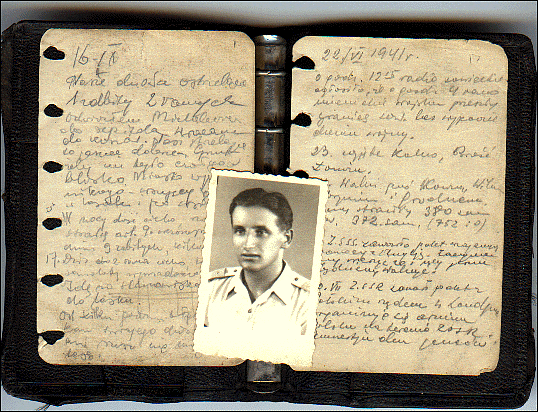
The Katyn Diary of Leon Gladun survived numerous encounters with death, both German and Russian. It chronicles battles in several campaigns and records the writer's travels through many countries on four continents. Though Leon died in 1973, the material in his diary is being used as evidence by the Commission for the Investigation of Crimes against the Polish Nation, in Warsaw. (Photo of Leon taken in Palestine).

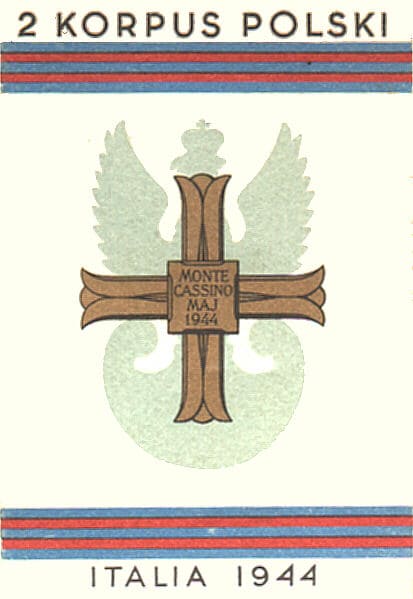
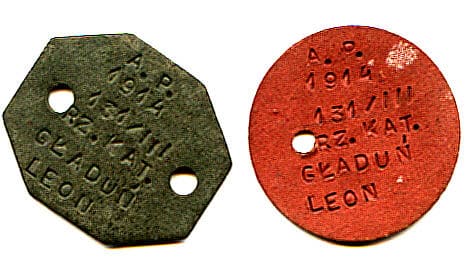
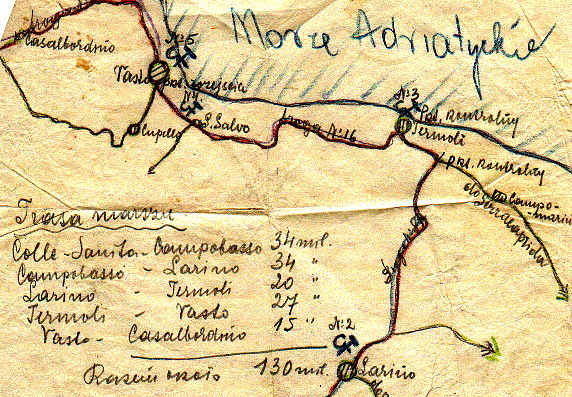
Plan of attack drawn by Leon

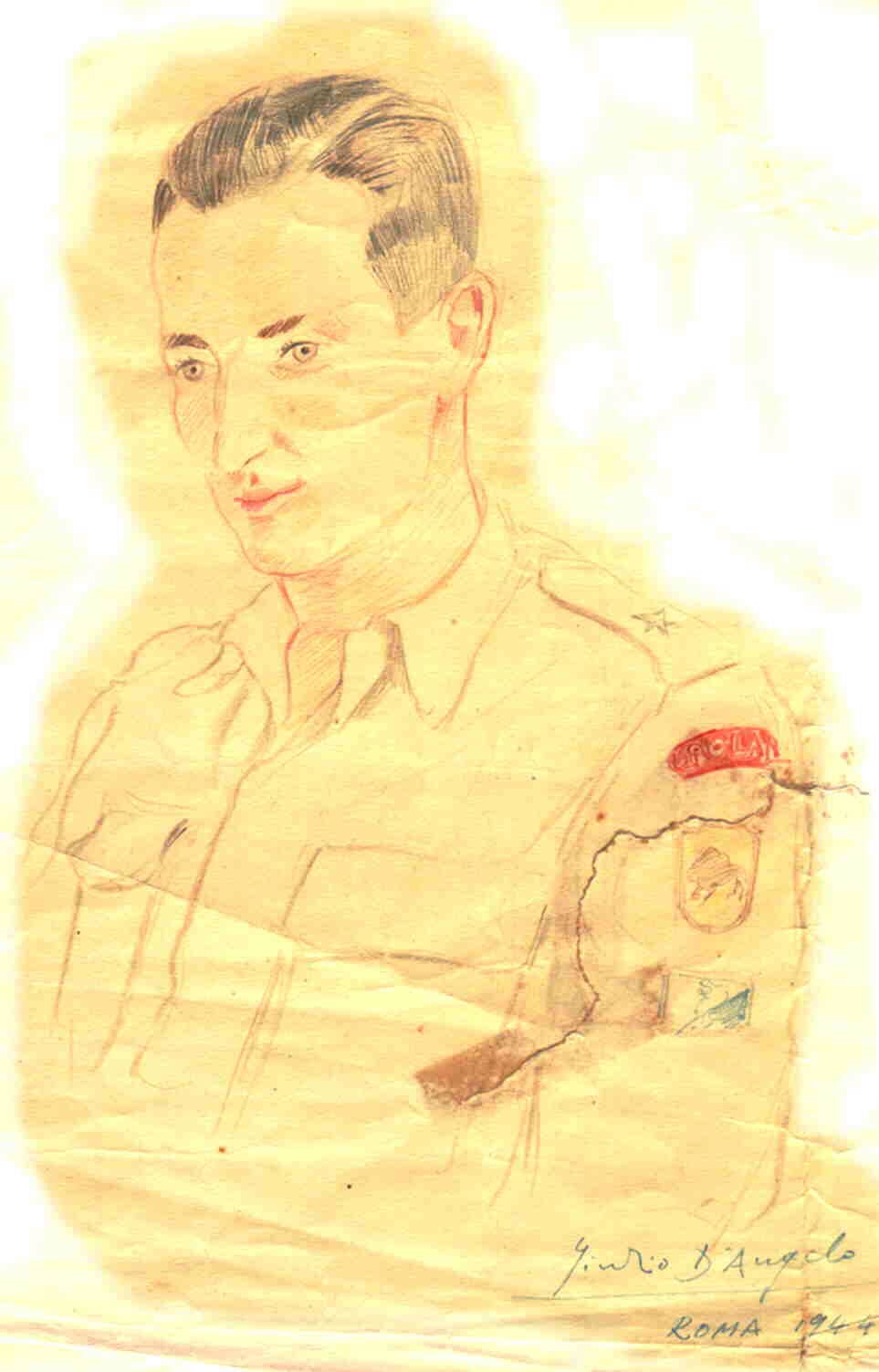
Leon drawn by friend, Rome, 1944.
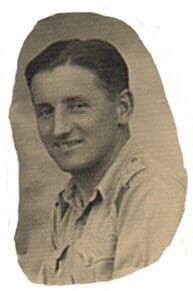
Italy
February 2 – I stand on Italian soil at 11:22 a.m.! From the port of Taranto we marched 8 kms.to our camp. Along the way Italian boys greeted us with half-Polish and half-Italian phrases such as “dobra pomarancza” and “migdaly paloci”–and with the Polish song: Antoni Kociubinski Dobre Migdaly Ma [Antoni Kociubinski Sells Good Almonds]. Wherever our legions have been stationed, the Polish language lingers. And so a song, one of the easiest forms of learning a new tongue, is taken up here by Italian children who are born singers. The countryside is similar to Syria: clay terrain, olive trees–and plenty of kids in our camps.
February 22 – After dinner we visited the nearby town and also were in Chiesee
February 23 – We visited Taranto. A fairly big city of some 200,000 people. Not much to buy in the stores. Much poverty caused by the war–there’s no clothing so many people walk around on wooden soles. Plenty of wine everywhere. The attitude of the people to us is still ambivalent because of German propaganda–at first it was harsh but it’s slowly changing for the better. I attended a show put on by an Italian troupe with Aniela and Halina.
March 14 – The third week has already passed. Soon we’ll be off to the front. An end to this tourist sightseeing–the war begins! So far this isn’t the real war as this sector is relatively quite; there’s little serious action here–no patrol clashes, artillery shootings…. The weather’s not too nice–rain, mud and cold.
To the Front!
March 18 – At 8:13 a.m–we’re off to the front! The weather is perfect with sunshine and dry roads. We pass through Taranto in trucks and enter the road famous in ancient history: the Via Appia. The way is beautiful with vehicular traffic both ways.
March 19 – We arrived at the town of Ferrazzano. It’s situated high on a mountain and built from stones like all of the towns in Italy. There are no actual streets here just numerous stairs leading uphill in all directions. We were billeted here for three days. At last I had a chance to practice my Italian conversation in which I’m steadily better able to make myself understood. I was in several homes where naturally there’s wine. Unfortunately this didn’t last long–after a few days we’re off for the front near Cassino.
March 23 – We set out further and by evening we had arrived at our billet–barracks in this case. Nearby was a high mountain on which stood the village of Roccaravindola.
March 24 – Roccaravindola–similar to Ferrazzano but even more steep. It dominates over the whole valley. The local church is interesting, to be precise the chapel itself, which is very old and dates from the 8th century–built 1200 years ago when Poland was not even yet thinking about Christianity!
March 24 – At 9 that evening we set off further north for our new position. The trip was slow without any lights; we only set up lighting when we arrived at 2 a.m. After several hours of work we went to sleep on cots in the open. I woke in the morning covered in snow. We’re close to the front near the village of Cerasuolo.
March 25 – Everybody is busy arranging things: huts, tents, latrines–in a word we’re finally at the front!
March 26 – Second day at the front: we do some shooting, and so far nothing more.
March 27 – For the first time we were shelled by German artillery. Some of us got a good fright and began building shelters!
March 31 – Through these days from time to time we receive a visit from a German shell. There are dead and wounded: 3 casualties so far from different detachments. As the days went by we became accustomed and no longer found the shelling disturbing.The front is not all that bad, at least so far. In fact it’s better than in garrison, at least here there’s no sorts of programs–you shoot either during the night or the day and after than nobody bothers you. Easter passed rather glumly. Blessings were given here and there but it was all done haphazardly. During lulls in the action we had to remind ourselves that it was Easter. On the first day of the holidays we fired as usual and they fired back as usual. Some of us thought that there might be a break–but that’s all crap as our “work” went on, even more heavily than usual.
April 12 – We’re leaving this sector. Everybody says that we’re bound for some more active sector near Cassino but it turned out we’re going for a two-week rest behind lines.We left at night and arrived near Prata, actually between the towns of Prata Sannita and Fontegreca.The area is beautiful and scenic–in a word an ideal setting with healthy air, clean water…if only all of us were as healthy.
April 14 – We toured Fontegreca–situated high in the mountains it’s similar to Ferrazzano. An old town with massive stone buildings, it has the most beautiful setting of all the villages that I’ve visited so far.
Assault on Monte Cassino
April 26 – Off for the front at Cassino. We were here for over a month. The most active sector of the front where so far we fired off the greatest amount of ammunition.
May 12 1944 – The long-awaited assault on Monte Cassino begins. Shelling non-stop for twenty-four hours. Enough time has passed so that my impressions of it have diminished so I won’t add anymore about it–and anyway a great deal has already been written about it for so long in the newspapers. In any case it wasn’t too bad at our stations: life settled down regularly. Work and rest in regular portions. Companionship wasn’t lacking. All in all a great many memories remain with me of this sector. I suspect conditions won’t be the same in the future. A more active and mobile war awaits us which will have its own flavor, but more about that later. I cherish many memories of that village for which I wrote: “Tu sei la vita nine la gioia mio enare.”
June 02 – We leave for a rest at the town of Colle Sannita. As everywhere we made a good impression on the local population by drinking their wine. I visit Naples and Pompeii.
June 17 – 22 – We leave Colle Sannita and return to the front. This time the chase is on against the Germans. We’re stationed at Madonna dei Mirracoli near Casalbordino on the Adriatic coast.
The Push Against the Germans
June 22 – We press on. The road is beautiful: the Via Adriatica. Along the way there’s signs of bombardment, blown-up bridges etc.
June 23 – Night quarters in Pescara. The city is in ruins–many houses are mined. The population is small as very few of the local inhabitants have returned to their homes after the Germans. Just 8 days ago the Germans were here.
June 26 – We drive on ever closer to the front. Our position is at Morrovalle where the Germans were just 24 hours ago. We don’t fire but move on further the next day.
June 27 – Again we sit a day without firing a shot. But constantly we move forward.
June 29 – A new position near the town of Recanati. We fired quite a bit until we ran out of sappers as the targets were already beyond 13,000 yards.
July 03 – Montefano. An excellent position. We fired the most on July 5-6. We’ve been here for a week. From the 7th we didn’t fire as it’s not needed. There’s plans for an assault but for now we sit and play cards. Our stay is extended to July 12. For several days we played kunkien and didn’t fire a single shot. I toured Loretto, the famous basilica and pilgrimage resort. It was well worth seeing.
July 12 – We move out for our next position at Le Caselle di Passatempo. We sat here for several days hardly shooting.
July 17 – Only on the 17th did the shooting start from 6:25. Either today or tomorrow we’ll be moving some 3 kms. Just one more jump and finally Ancona will fall, and then we’ll probably be off to Rome for some rest and recreation, as they say, near Rome. That evening were getting ready for the advance but we left only in the morning as the Germans had retreated considerably further and so we moved ahead some 8 kms to the north.
July 18 – Polverigi/Palaro Marini. New position where we fire beyond 10,000-11,500. According to the latest news our infantry is already 1.5 kilometers from the sea and Ancona is cut off. Probably there are no Germans left in the region of Ancona and we assume the city will be abandoned today or tomorrow. That evening we received news that our detachments had taken Ancona and then moved far west along the sea past the River Esino. The surprise was complete. The Germans left much equipment, and 2,000 prisoners so far. Another success for us of which the newspapers write.
July 19 – Castel d’ Emilio. A new position but we didn’t fire a shot here.
July 20 – We change our position–it seems our last before we get a rest. We’re on the other side of Castel d’ Emilio now.
July 25 – A new position near the village of Monte S. Vito. Only once did we execute some defensive fire. Otherwise we do little–our fifth day and we’re getting bored. We sat like this for 10 days without firing a single shell. I visited the city of Jesi by motorcycle.
August 7 – A new position at Filetto. Next day we completed a small plan of artillery fire in support of an offensive. We fired till evening.
August 9 – A new position near the village of Ripe. PD [command post] in a house which is quite comfortable. I do a bit of shooting for propaganda purposes. The Germans are shelling the area quite a bit.
August 10 – Just now (at 13:39) a shell hit our battery followed by another. The enemy barrages are very close–around 4,000 yards, so no wonder that we get a German “gift” from time to time.
Frayed Nerves…
August 15 – We set out that morning for a new position – pretty good. The Germans are shelling the nearby town but they haven’t reached us yet.
August 18 – This morning we were to execute a plan of artillery fire for an offensive but it’s called off due to the damn heavy rain overnight and the resulting mud. I got soaked under my tent–I was literally swimming in my bed. Today I failed a bit with my command–by 5 degrees! (Artillery requires very careful and detailed work; the mistake was due to a sloppy oversight by Corporal Rybkin.) All in all I’d like to finish this game. If you worry about everything your nerves will be shot and you’ll go off as a patient to a nut house. There are moments when every ring of the phone sets me off and when in this mood I confront some mix-up or problem–then I just say to hell with everything! Besides our political situation is murky and unsure. I get mad as hell when I read the foreign press about the Polish question and see the shitty actions taken by certain characters. It’s partly due to our own ineptitude in pressing our political situation back home and in the worsening of our position due to our clumsy opposition to the disgusting politics of the USSR. In just half a month 5
years of war will pass, and come to an end–but our situation is still under a question mark. However we’re counting on a conflict between the Soviets and the Americans…otherwise it’ll be bad for us. “The Miracle on the Wisla” continually remains! [The dramatic Polish victory at Warsaw over the Bolsheviks in 1920.]
August 20 – Change position. This time PD is in a house which is very convenient–we work comfortably almost like clerks at our desks. Unfortunately we weren’t there long–just two days. We’re relieved by 3rd Division, 1 PAL. For the first time there was a formal change of detachments. That evening officers from the other division arrived to whom we turned over command and by the next morning the change was complete.
August 22 – We were misled. We wait at our position for several hours. The reconnaissance party left in the morning but it turned out that there was a medium […] stationed in our area. Finally at 18:00 hours we left for our new position: a field with a couple of trees and nothing else. But luckily we won’t be here for long judging by the gun layers. Today I was picked to go on a trip to Rome. About 25 are going.
A Tourist in Rome
August 25 – We set off for Rome in the morning: Banasiewicz, Blicharski and myself. The road is splendid, mostly asphalt. We’re crossing the Italian peninsula from one side to the other. Near the city of Terni we pass by the beautiful falls called La Cascata delle Marmore. A wonderful sight. The falls are 40 meters high over which a great deal of water cascades with a roar–exploding into white foam and producing a mist for tens of meters around. Nearby the falls are factories: an electrical works, largely destroyed, some chemical works and finally the Fiat enterprises. The trip lasted from 05:30 hours to 16:00 hours and was about 230 miles. Finally we arrived in Rome. After a lengthy search we installed ourselves in the Hotel Imperial. For 3 days we toured many historical sights of which there are so many that 3 months much less 3 days is not enough to became acquainted with everything. Rome makes a much greater impression on me than accursed Naples. I visited the Colosseum, the Forum, Romanum, Capitol, Panteon, the Catacombs, St. Peters and St. Pauls which is impressive. But my favorite is the Church of St. Andrew–the original round shape and the attention to detail. Here are kept the remains of St. Stanislas Kostka. Many beautiful women–this is the first impression that strikes one on the street, and the huge amount of soldiers mostly Americans. I hadn’t written for a while as there just wasn’t time. So much to write about but so little time. We returned from Rome on the 30th and changed positions several times again.
September 4 – We’re off for a rest at Casette d’Eete near the city of Civitanova. Our quarters are a mess over an area of 4 kms.
September 17 – I set off on a 7-day vacation to Rome with Jurek. As this was my second visit I visited less sights and only the more interesting ones.
Christopher Jacek Gladun was born in 1951 and grew up in Canada to where his family emigrated from England as displaced persons. Sadly, Chris died in Toronto in March 2003. He held a diploma in Journalism from the Niagara College and a BA in Polish Language & Literature from the University of Toronto. Chris also acted as interviewer and researcher for the documentary film “Rescued From Death in Siberia”.
This content is now maintained by the Kresy-Siberia Group, which Chris was a charter member of and which is taking his website and his research work forward.